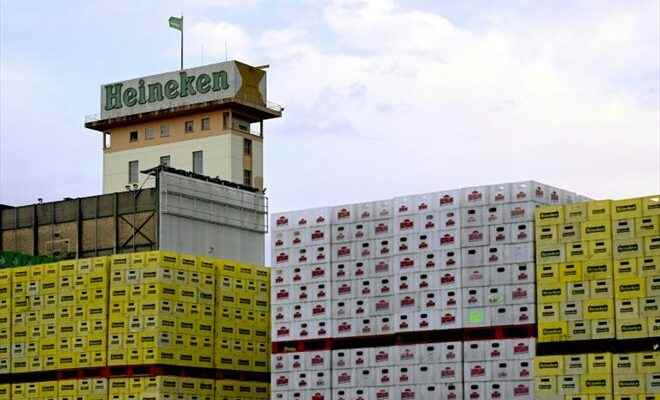The Schiltigheim brewery near Strasbourg, November 14, 2022 (AFP / FREDERICK FLORIN)
The Heineken brewer announced on Monday the closure “within three years” of the last large brewery in Schiltigheim, in the suburbs of Strasbourg, in a context of “declining market share”, and an investment plan for the Marseille sites. and Mons-en-Baroeul (North).
The closure of the Alsatian brewery threatens 220 jobs.
“Social dialogue will be the priority for the next few months,” said the group in a press release, which aims to reach a “collective agreement” around a job protection plan (PSE).
Heineken justifies the cessation of this activity by “the many constraints to which the site is subject”, its isolation in the city center which “prevents any expansion”, its “excessive production costs due to certain obsolete equipment” and its ” strategy of industrial diversification which has not borne fruit”.
The volumes produced in Schiltigheim will be transferred to the two other French production sites, in Mons-en-Baroeul and Marseille. These two sites will benefit from an investment plan of 100 million euros with a view in particular to their expansion and “improving environmental performance”.
“This project to concentrate our production tool on two breweries instead of the current three is necessary to ensure our long-term competitiveness in France,” said Pascal Gilet, CEO of Heineken France, quoted in the press release. “We will also carefully consider any offer to take over the site that may be proposed.”
– “It’s cynical” –
The Fischer brand beer, brewed in Alsace “since 1821” and whose Alsatian identity is a marketing argument, will remain produced locally, in a “micro-brewery”.

The volumes produced at Schiltigheim will be transferred to the two other French production sites, in Mons-en-Baroeul and Marseille (AFP/Archives/Philippe HUGUEN)
This announcement is part of a context of “decline in market share” according to Heineken, caused by “the increase in the cost of raw materials and energy”, the impact of the health crisis on “the coffee sector -hotels-restaurants” and “increased competition”, in particular with the increase in the number of micro-breweries.
In France, the group announces that it has seen its market share in cafes, hotels and restaurants fall from 28.9% in 2016 to 23% in 2021.
At the change of shift at midday, many employees of the Schiltigheim factory displayed a closed face, while denouncing a “half-surprise”.
“The production volumes were leaving, there had been no more investment for several years, the equipment was not renewed”, explained to AFP a worker with “more than 30 years of seniority”, asking to stay anonymous. “And that was long before the health crisis, long before the war in Ukraine. But there, all the excuses were there to close. It’s opportunism, it’s cynical.”
– “Alarm signal” –
“It’s a blow for everyone,” conceded Didier Deregnaucourt, CGT delegate, announcing a strike for the day on Tuesday. Another employee recalled that a closure plan had been drawn up in 2013 and then abandoned.
In Schiltigheim, Heineken had already closed the Adelshoffen brewery in 2000 and was accused of artificially creating the industrial and financial conditions to condemn the site, in particular by withdrawing the production of its famous Adelscott beer, launched in 1982, for the deport to the less profitable niche of first-price beers and distributor brands.

The Schiltigheim brewery near Strasbourg, November 14, 2022 (AFP / Frederick FLORIN)
“With the departure of Adidas (announced in June, editor’s note), it’s a new blow for the third constituency of Bas-Rhin”, lamented LREM deputy Bruno Studer, worried about the “loss of economic attractiveness” of the territory. “This announcement is a wake-up call that needs to be heard,” he warned.
Heineken, the second largest brewer in the world behind AB InBev, had recorded a net profit of 3.32 billion euros in 2021, after losses of 204 million euros in 2020, a year marked by the coronavirus pandemic.
Founded in the 19th century in Amsterdam, the multinational produces and sells more than 300 brands of beer and cider, including Heineken, Strongbow and Amstel, and employs more than 85,000 people worldwide.
© 2022 AFP
Did you like this article ? Share it with your friends with the buttons below.




